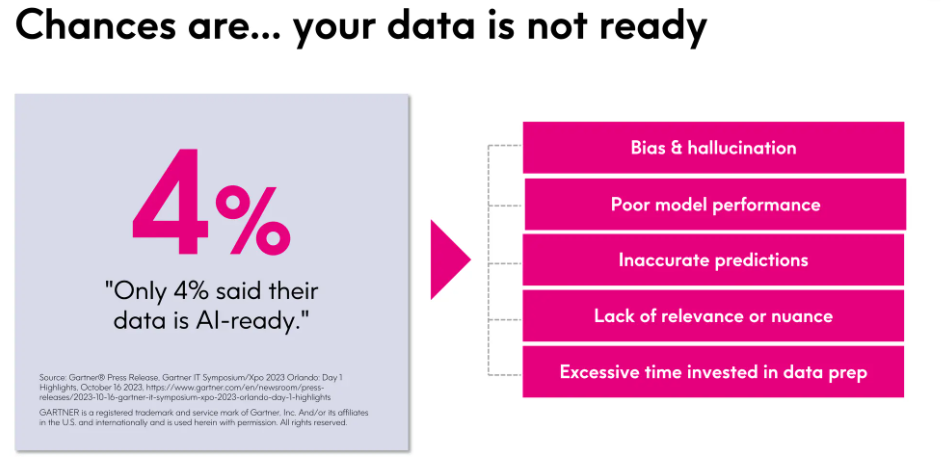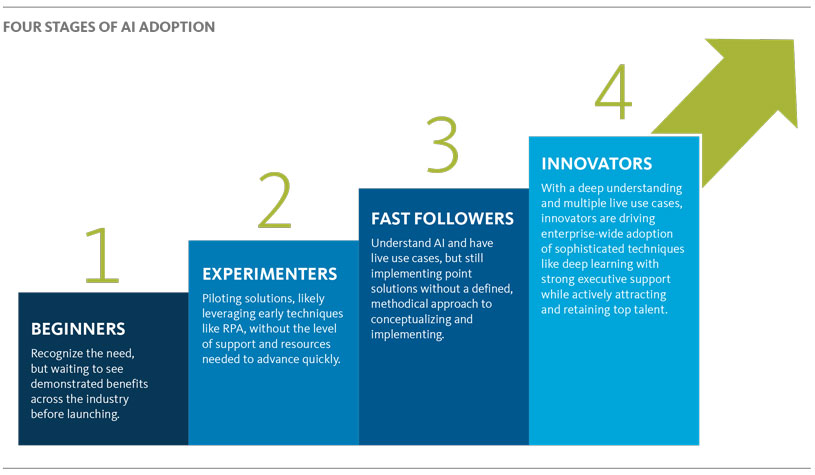Generative AI (GenAI) is reshaping the way we work, unlocking new possibilities for innovation, efficiency, and competitive edge. But to truly capitalize on GenAI’s potential, organizations must go beyond adopting new tools or adding a few specialists—it requires a comprehensive, yet simplistic, strategic shift throughout the organization.
Leaders need to ensure their organizations are “AI-ready” in terms of technology, talent, culture, governance, and our personal favorite, data. At Solvenna, we specialize in helping organizations within Retail, Cannabis, Healthcare and CPG industries plan for and introduce new GenAI capabilities.
In this guide, we’ll explore how to create a GenAI ready organization, empowering you to take the lead in adapting your company for the GenAI revolution.
1. Prepare Your Data & Technology Infrastructure
To leverage GenAI successfully, your organization must have a robust digital infrastructure. Here’s how to get started:
- Cloud Computing & Data Storage: GenAI models are data hungry and compute intensive. Ensure your infrastructure can handle the storage and processing requirements. Cloud platforms offer the scalability necessary to support these needs.
- Data Strategy: Without high quality, diverse data, GenAI cannot generate meaningful outputs. Invest in a data governance framework that ensures data is collected, organized, and accessible. The quality, volume, and diversity of your data directly impact the effectiveness of GenAI models. Remember “Garbage in = Garbage out”!
- APIs & Integration: GenAI solutions must seamlessly integrate into your existing tech stack. Establish a flexible architecture that enables easy integration with AI tools, allowing for smooth interaction between AI outputs and your business processes.

2. Upskill Your Workforce for an AI Future
While GenAI can automate tasks and augment decision-making, the human element remains critical. Empower your workforce by ensuring they have the necessary skills:
- AI Literacy: Foster a company-wide understanding of AI, especially among non-technical teams. Everyone in the organization should understand what GenAI can and cannot do, and how it fits into their roles.
- AI Talent: Invest in hiring or upskilling key talent such as data scientists, machine learning engineers, and AI ethicists who can develop, fine tune, and monitor GenAI systems. Offering continuous learning opportunities through workshops or partnerships with educational institutions is essential for staying ahead.
- Cross-functional Teams: The impact of GenAI extends beyond the tech team. Create cross-functional teams that combine domain expertise with AI knowledge to identify valuable AI use cases and execute them effectively.
3. Foster a Culture of Innovation and Experimentation
AI thrives in environments that value creativity, agility, and calculated risk taking. To build a GenAI ready organization, your company culture must embrace innovation:
- Encourage Experimentation: Create a culture where teams feel empowered to test GenAI models, learn from failures, and iterate. This requires psychological safety—where employees feel comfortable taking risks and experimenting with AI applications without fear of failure.
- Pilot Projects: Start small with pilot AI projects that address specific challenges or opportunities. Celebrate quick wins to build momentum and demonstrate the value of AI across the organization.
- AI as a Collaborative Tool: Position AI not as a replacement but as a collaborator to human creativity. Highlight how AI can enhance roles, optimize decisions, and improve overall job satisfaction by taking over repetitive tasks and leaving more time for strategic work.
4. Implement Ethical AI Governance
As AI becomes more embedded in your organization, it’s critical to implement governance practices that ensure the responsible and ethical use of AI:
- AI Ethics Policies: Create a set of AI ethics guidelines that emphasize transparency, accountability, and fairness. This should include clear policies for handling sensitive data, avoiding bias in AI outputs, and ensuring compliance with regulatory requirements.
- Human Oversight: Ensure that AI tools are continuously monitored by humans. Establish review processes to check AI decisions and outputs, especially in areas like HR, marketing, or customer service, where AI could inadvertently cause harm.
- Data Privacy and Security: With GenAI tools collecting and analyzing vast amounts of data, it’s critical to have robust cybersecurity measures in place. Implement rigorous protocols for data protection to safeguard against breaches and maintain customer trust.
5. Align AI Strategy with Business Goals
GenAI can be a powerful tool, but it’s only as valuable as its alignment with your business objectives. Focus on use cases that can create real value for your organization:
- Identify High-Impact Areas: Work with business leaders to identify where GenAI can drive the most value. This could be in product design, customer service, supply chain optimization, marketing, or any other function that would benefit from intelligent automation or insights.
- Measurable ROI: Every GenAI initiative should be tied to clear, measurable outcomes, whether that’s cost savings, revenue growth, or enhanced customer satisfaction. Track these metrics to ensure AI investments are delivering tangible results.
- Long-term Vision: GenAI adoption shouldn’t be a one-off project. Build a roadmap that aligns your AI journey with your broader business strategy, ensuring your organization evolves alongside the technology.

Benefits of Building a GenAI Ready Organization
1. Enhanced Personalization
GenAI’s ability to process vast amounts of data allows for personalized interactions at scale. By analyzing customer behaviors, preferences, and past interactions, AI systems can recommend products, tailor marketing messages, and customize services to meet the specific needs of individual customers. This deep level of personalization can drive higher engagement, increased average order value, and improved customer lifetime value.
2. Improved Customer Experience & Satisfaction
One of the immediate impacts of GenAI is the ability to drastically reduce response times for customer inquiries, internal processes, or decision making. For example, AI-powered chatbots can resolve customer issues 24/7 without human intervention, delivering instant responses to common queries. In a world where consumers expect immediate service, this speed can significantly enhance customer satisfaction and loyalty.
3. Cost Savings
GenAI can optimize processes and reduce inefficiencies, allowing organizations to save costs without sacrificing quality. By automating repetitive tasks such as data entry, scheduling, or routine customer service inquiries, businesses can free up valuable time for employees to focus on higher-impact activities. For instance, automating customer support for frequently asked questions allows customer service agents to focus on resolving more complex issues that require a human touch, leading to better customer experiences.
4. Employee Empowerment Through Automation
Automating routine tasks allows employees to focus on higher value work. Instead of manually segmenting audiences, AI can help handle personalization, allowing the team to spend more time on innovative ideas and engaging with customers through high impact initiatives. With AI taking care of repetitive tasks, teams can redirect their energy toward creative, strategic, and problem-solving activities, leading to increased job satisfaction.
5. Data-Driven Decision Making
GenAI not only enhances customer interactions but also drives smarter decision making across the organization. By analyzing patterns in customer behavior, market trends, pricing strategies, and operational efficiencies, AI models provide actionable insights that help leaders make informed, timely decisions. These decisions can be implemented to optimize Sales, Service and Marketing interactions. This shift towards data-driven strategies ensures that business initiatives are not just reactive but proactive, allowing organizations to identify growth opportunities, minimize churn, and better allocate resources.
Conclusion: Leading the GenAI Transformation
Building a GenAI ready organization is no longer optional for leaders seeking long-term growth and innovation. By incorporating GenAI into their operations, companies can unlock a wide range of benefits including operational efficiencies, cost savings, improved customer engagement, and empowered employees. The key to realizing these advantages lies in a strategic, well-rounded approach that ensures AI is seamlessly integrated into the fabric of the business, empowering both technology and people to drive value together.
At Solvenna, we’ve guided similar transformations, helping companies build scalable solutions that can seamlessly integrate AI into their existing systems while focusing on improving customer interactions and overall business performance. Our focus on leveraging first- and third-party data ensures that our clients optimize their customer experience (CX) and build a solid foundation for future AI initiatives. Through our GenAI & Machine Learning Enablement services, Solvenna can help businesses like yours identify high-impact AI use cases and measure ROI, ensuring that every AI initiative aligns with your long-term goals.
The future will be both AI-supported and AI-driven—ensure your organization is ready for it.








